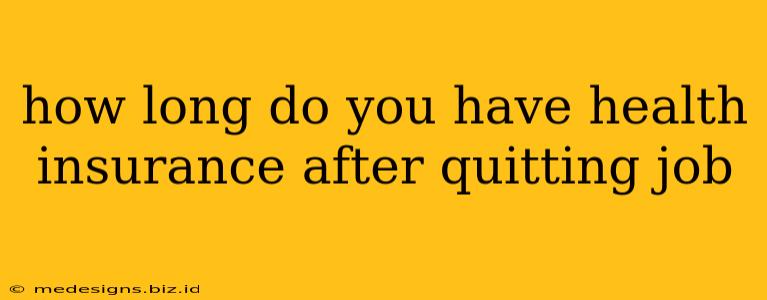Losing your job can be stressful, and figuring out what happens to your health insurance adds another layer of complexity. Understanding your options is crucial to ensuring you and your family remain covered. This guide will clarify how long your health insurance coverage lasts after you leave your job and outline the choices available to you.
COBRA and Your Continued Health Insurance Coverage
The Consolidated Omnibus Budget Reconciliation Act (COBRA) is a federal law that generally allows you to continue your employer-sponsored health insurance coverage for a limited time after you lose your job (or experience a qualifying event). This is a crucial safety net, but it's important to understand the specifics.
How Long Does COBRA Last?
COBRA coverage typically lasts for 18 months from the date your group health plan coverage would otherwise end. However, there are some exceptions and variations. For example, if you lose your job due to gross misconduct, your COBRA eligibility might be affected.
What are the Costs of COBRA?
A significant drawback of COBRA is the cost. You're responsible for paying the entire premium, including the employer's portion, which can be substantially higher than what you were paying while employed. It's essential to get a detailed cost estimate from your plan administrator before deciding if COBRA is financially feasible.
Alternatives to COBRA: Exploring Your Options
COBRA might not be the best option for everyone, especially considering the expense. Here are some other pathways you can explore:
1. Spouse's Employer-Sponsored Plan:
If your spouse has employer-sponsored health insurance, you may be eligible to join their plan. This is often a more affordable alternative to COBRA. Check your spouse's plan details for eligibility and enrollment requirements.
2. Marketplace Insurance (Affordable Care Act):
The Affordable Care Act (ACA) established health insurance marketplaces where you can find plans that suit your needs and budget. Open enrollment periods are generally in the fall, but special enrollment periods exist for qualifying life events like job loss. The marketplace offers subsidies and tax credits to help make coverage more affordable based on your income.
3. Medicaid:
Depending on your income and state, you might qualify for Medicaid, a government-funded health insurance program for low-income individuals and families. Eligibility varies by state, so you'll need to check your state's Medicaid website for specific requirements.
4. Short-Term Health Insurance:
Short-term health insurance plans offer temporary coverage, usually lasting a few months. They are generally less expensive than COBRA or ACA plans but often have more limited coverage.
Understanding Your Timeline: Crucial Steps
The clock starts ticking the moment your employment ends. Don't delay in exploring your options:
- Contact your HR department: Obtain information about your COBRA rights and deadlines.
- Review your COBRA paperwork carefully: Understand your rights, responsibilities, and the costs involved.
- Compare your options: Assess the cost and coverage of COBRA, your spouse's plan, ACA marketplace plans, Medicaid, and short-term insurance.
- Enroll promptly: There are strict deadlines for enrolling in COBRA and marketplace plans. Missing these deadlines could leave you without coverage.
Losing your job is a significant life event. By understanding your health insurance options and taking proactive steps, you can ensure you and your family continue to receive the necessary healthcare coverage. Don't hesitate to seek guidance from a benefits specialist or insurance broker if you need help navigating the complexities of choosing the right plan for your situation.
